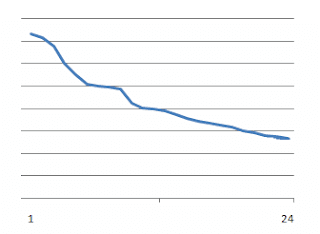
The good news in the U.S. economy… the stock market, despite recent dips to reflect bad economic news, is still relatively strong, and manufacturing inventories are down suggesting a need to hire more workers to build them back up.
End of good news.
Beginning of bad news:
1. Unemployment – “The U.S. economy added 54,000 jobs in May, the fewest in eight months. The unemployment rate rose to 9.1 percent.” WashingtonPost.com, June 3rd. Under employment is still the hidden headline. As past blogs have supported, recent college grads are having a terrible time finding work commensurate with their education. And in some professions where significant post-undergraduate study is required, the numbers are really bad (according to the June 1st ABAJournal): “Law graduates in the class of 2010 have set a new record, and it’s not a good one… Only 68.4 percent of 2010 grads were able to land a job requiring bar passage, the lowest percentage since the legal career professionals group NALP began collecting statistics.
”Another 10.7 percent have jobs that don’t require bar passage but prefer or require a JD [juris doctor – a law degree], while 8.6 percent are employed in other capacities… The statistics are based on jobs held nine months after graduation for those whose employment status is known…The classes of 2009 and 2008 had higher percentages of jobs requiring bar passage, at 70.8 percent and 74.7 percent respectively… Overall the employment rate for 2010 grads is 87.6 percent, the lowest percentage since 1996 when the rate was 87.4 percent. Only 71 percent of the jobs were both full-time and permanent.”
2. Housing – “Home prices in 20 U.S. cities fell 5.1 percent in the first quarter, the largest decline since 2009's first three months, according to S&P/Case-Shiller index figures released [June 1st].” Detroit News, June 1st.
3. Economic Growth – the US economy was projected to grow at rates hovering around 3%, but the first quarter of 2011 showed a considerable slowing of that expansion to a meager 1.8%.
4. Retail sales – While there was some strength in retail sales, rising gasoline and commodities prices in general probably pushed up the numbers. Drilling down into market segments that generally reflect economic confidence produced startlingly bad news: “About 1.1 million vehicles were sold last month, 3.7% less than a year earlier and 8.3% less than in April, Autodata Corp. said, as economic data perplexed consumers.” Los Angeles Times, June 1st.
Hey, don’t worry, if you think this clear and convincing evidence that the “double dip” part of the recession has arrived is bad news, remember, there are a bunch of stalemated members of the House of Representatives, struggling to impose cuts and keep taxes low as a precondition to raising the debt ceiling, hell bent on major austerity measures… the kind that tanked the current economy in the UK and are provoking raging and massive protests in Spain and Greece, two economies that seem to be sinking faster than the Titanic. Oh, and the Federal Reserve still thinks that we are not going into a double dip, even though they don’t seem to be able to produce any numbers supporting that assumption, and all the leading indicators are saying otherwise.
We clearly don’t have consumers willing to spend – they are fearful of losing their jobs or simply aren’t able to earn what they once did – so anything that vastly cuts federal (state and local) jobs and contract federal spending will clearly ripple through the economy as these soon-to-be-laid-off individuals also spend less money and reduce demand further. Until now, government demand replaced a very fragile and shaky consumer demand curve. And let’s face it, if you think that a “boss” will starting hiring new workers simply because he/she is paying less taxes and has more discretionary income, trust me, they didn’t get to be a boss by hiring people in the absence of clear consumer demand for what the new hires would be producing. With austerity measures certain, you can expect the only remaining source of market demand – the government – to step aside and let the economy drop to a new low.





No comments:
Post a Comment